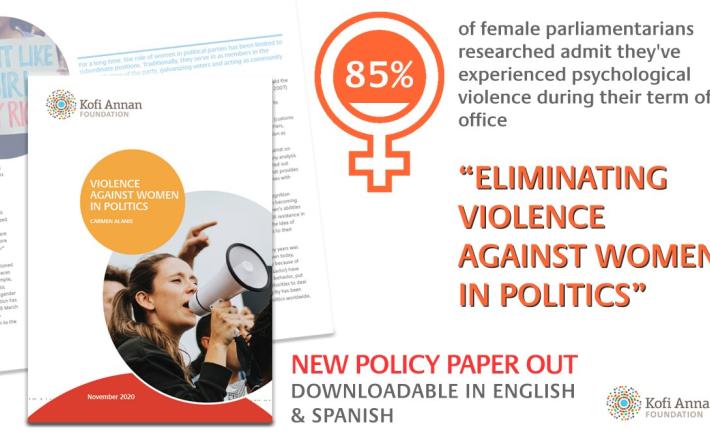Eliminating violence against women in politics: What works and what doesn’t?
Violence against women in politics is an intolerable violation of women’s rights which poses fundamental challenges to democratic values and electoral processes. To tackle this issue, the Kofi Annan Foundation commissioned Carmen Alanis, the first female Chief Justice at the Superior Chamber of the Electoral Court of Mexico, and member of the Kofi Annan Foundation’s Electoral Integrity Initiative, to produce a policy paper which highlights the barriers women face in their attempts to access political spaces, as well as the challenges they encounter if elected to public office.
- In attempts to shed light on the extent of the problem, the paper addresses three vital questions:
- Why do women face barriers in exercising their political and electoral rights?
- If violence against women in politics is a global phenomenon with a negative impact on democracies, why is the problem still not being adequately addressed by states?
- Do current models of access to justice engage with the issue effectively?
The paper demonstrates that violence against women in politics undermines electoral integrity by disregarding the principles of universal suffrage and political equality. These principles are not being fulfilled in both newer and older democracies across the world, with various barriers to equal and universal political participation.
Click here to see the report.

Violence against women in politics is an intolerable violation of women’s rights which poses fundamental challenges to democratic values and electoral processes. To tackle this issue, the Kofi Annan Foundation commissioned Carmen Alanis, the first female Chief Justice at the Superior Chamber of the Electoral Court of Mexico, and member of the Kofi Annan Foundation’s Electoral Integrity Initiative, to produce a policy paper which highlights the barriers women face in their attempts to access political spaces, as well as the challenges they encounter if elected to public office.
- In attempts to shed light on the extent of the problem, the paper addresses three vital questions:
- Why do women face barriers in exercising their political and electoral rights?
- If violence against women in politics is a global phenomenon with a negative impact on democracies, why is the problem still not being adequately addressed by states?
- Do current models of access to justice engage with the issue effectively?
The paper demonstrates that violence against women in politics undermines electoral integrity by disregarding the principles of universal suffrage and political equality. These principles are not being fulfilled in both newer and older democracies across the world, with various barriers to equal and universal political participation.
Click here to see the report.